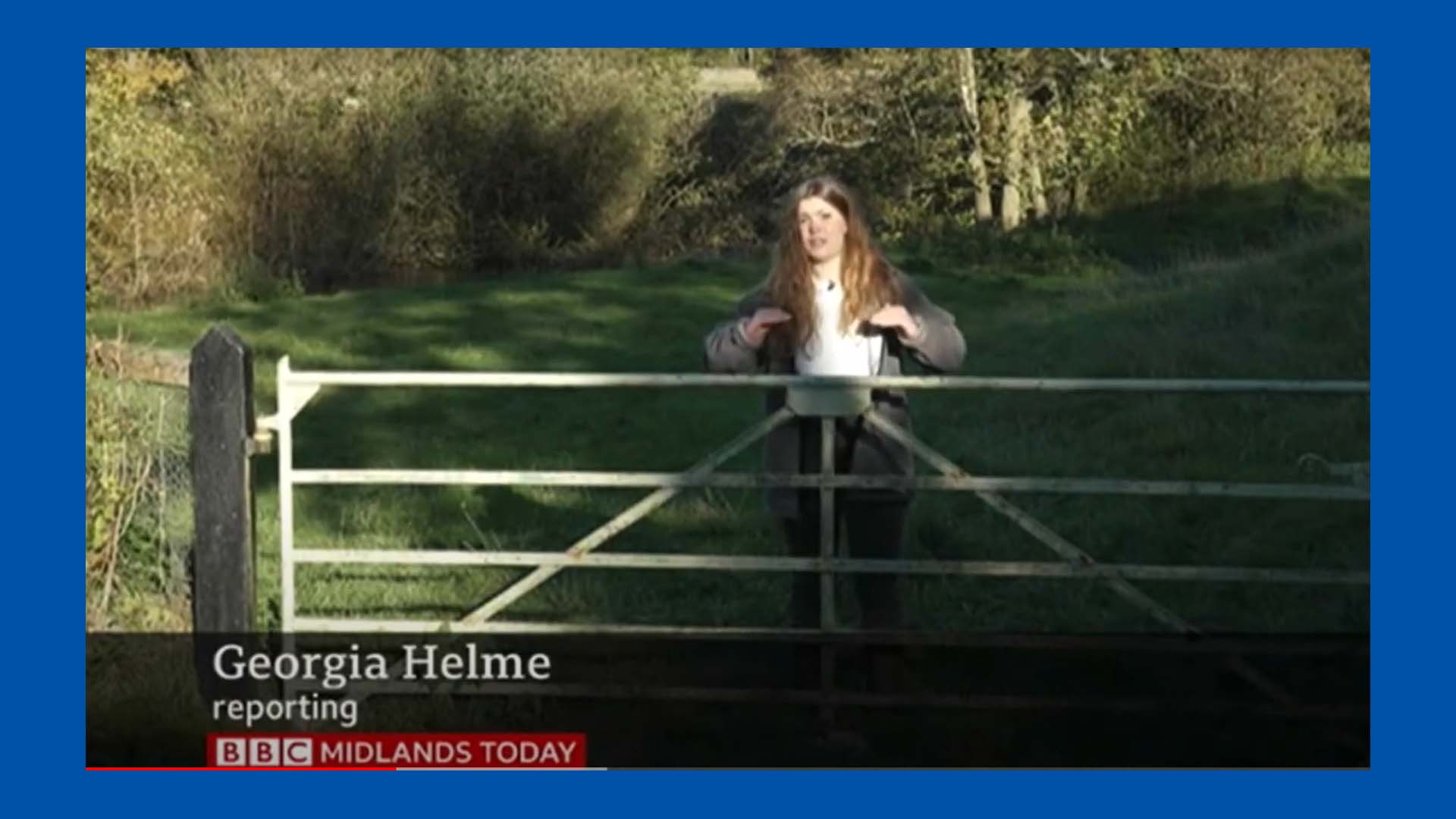Media graduate Georgia Helme’s passion for putting rural issues into spotlight has led to her becoming one of a select number of young people chosen to file a report on the effects of climate change for the BBC.
Georgia graduated with her Media and Popular Culture degree from Huddersfield in 2021 and was one of just 22 to be chosen for the BBC Young Climate Reporter scheme.
Her report on the damage caused by the dumping of raw sewage into the River Lugg in her native Herefordshire was broadcast by BBC Midlands Today to coincide with the COP26 conference, and now she aims to take matters affecting life in the countryside to a wider audience from a rural-based perspective.
“I got involved with BBC Hereford and Worcester as part of a documentary which I made as an assignment at Huddersfield,” says Georgia. “It was about mental health in rural areas, and I sent it in as part of my application for BBC Young Climate Reporter scheme.
“It is a really relevant topic and it is gaining so much media coverage at the moment. There have been discussions in Parliament about whether the wholesale dumping of raw sewage will be legalised or whether water companies will be stopped from doing that straight into rivers.”
Georgia's piece on pollution in the River Lugg in Herefordshire went out on BBC Midalnds Today, and was introduced by presenter Nick Owen.
The report has a truly personal aspect for Georgia, as it features her footage of a devastating flood on her parents’ farm from February 2020. She can be seen wading through filthy, chest-high water to rescue lambs and pregnant ewes, and with the farm still recovering from the flood nearly two years later, the subject of climate change, man-made environmental damage and their effects on her family and home are still motivating Georgia.
“Working in this region is really important to me,” she adds. “I was lucky enough to get hands-on work in Yorkshire and gain experience, but I would love to show off Herefordshire as much as I can. My dissertation was on rural affairs and their presentation by television, and I found that there is no rural coverage by rural people. Generally, coverage by the mainstream media is very urbanised, it’s the rose-tinted rural idyll and a topic is never really covered unless it contradicts that rural idyll.
“Issues like poverty and hardship are only ever shown from an urban perspective, so to be able to show how people are coping in rural areas is really important to me.”
Georgia’s four years at the University included one working out in the industry, gaining invaluable experience working for Daisybeck Productions in Leeds, working on such popular programmes as The Yorkshire Vet, Made in Britain and Springtime on the Farm.
Georgia filed this piece about mental health issues for people living in the countryside while at the University of Huddersfield
More recently she has worked on Bidding Room and a new Richard Hammond series for Discovery Channel, but the BBC report has coalesced her recent experience around a subject close to her heart.
“The camera crew and reporters gave me brilliant advice and tips about getting ideas over on screen to a good, newsworthy standard. I appreciated my placement year and took so much from it, and you can be taught so much at university but it is not until you have experienced it yourself with that first-hand experience that you really get a feel for it to understand what it is like to be working in the field.
“I didn’t understand how quick TV news is and how tight the turnarounds are. You also need to be aware of the latest news situation because things are changing all the time in journalism, and you have to be really ‘hot’ on it.
“There was a lot going on behind the scenes, things were changing politically with it. There were different voices that we wanted to include, plus statistics and figures. It was something you don’t understand until you have taken part in it.”

The feature highlights how raw sewage has been pumped by Welsh Water into the river just upstream from Georgia’s family’s farm, and even includes an executive from the utility company giving their side of the argument on camera. With the piece introduced by broadcasting veteran Nick Owen, the whole process has been a revelation for Georgia as she embarks on a new role as a location assistant with BBC England.
“In my script, I had written that Welsh Water wouldn’t comment, I was trying to contact them for weeks and we were shocked that they did. The brilliant team at Midlands Today put it to them that it might not look good if they didn’t say anything! I had to revise my script a lot, and I even had to write Nick’s introduction to it so to have him read it was wonderful, as was the whole experience.”
Subject Area Leader for Media, Journalism and Film, Richard Jones, said: “I’m delighted that Georgia’s journalism has been recognised by the BBC. It’s testament to the hard work she has put in during her degree, and how she has taken advantage of all the opportunities which have come her way. I’m sure we’ll be seeing a lot more of her on our screens in the future.”
{{item.title}} - News Story
